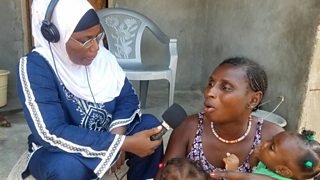‚ÄėWhy I‚Äôm helping protect pregnant women from malaria in Sierra Leone‚Äô
Eastina Massaquoi
Producer, ¬ť∂Ļ‘ľŇń Media Action Sierra Leone
Tagged with:
As the world marks World Malaria Day, hear from Eastina Massaquoi, the presenter of our new radio programme (which means 'Determined for Health') in Sierra Leone. Eastina helped stop Ebola and now she’s applying what we learned during the 2014-2016 crisis to help tackle malaria – which causes 40% of deaths outside of hospitals across the country.
In January 2010, three days before my 21st birthday I was admitted to Konibanks Hospital in Freetown. My (now late) mother had called my boyfriend late at night asking him to rush me to the nearest hospital because I was restless, weak, and couldn’t hold anything in my stomach.
I was diagnosed with severe malaria.
Before being hospitalised I have to admit I was clueless about how dangerous malaria is and how lightly we take it in Sierra Leone. It was a wake-up call and made me recognise how important awareness of the dangers of malaria is. After being unable to celebrate my 21st birthday, I made a commitment to myself to always go to the hospital for a malaria test and to receive proper treatment.
I realised that I could have died at 21.
My boyfriend later became my husband and when I fell pregnant with our first child taking the advised measures to prevent malaria became even more important. Sleeping under a treated bed net, cleaning to prevent malaria breeding grounds and taking three doses of sulphadoxine-pyrimethamine (SP), an anti-malarial for pregnant women became second nature. And by taking these precautions I’ve now given birth to two healthy, malaria-free babies.
But I am just one of thousands of women who get pregnant every day in Sierra Leone. Many women are either unware of how to protect themselves – like I used to be – or simply don’t know that free malaria prevention services are (or should be) available at government health facilities.
If their symptoms are not perceived as life-threatening people often resort to ‘first aid’ like treating a fever or diarrhoea with oral rehydration solutions or paracetamol rather than treating the real cause: malaria.
On top of that, there are many common myths and misconceptions about the disease in Sierra Leone. Often people believe malaria is caused by cold or changeable weather, or you can catch it by eating fruits like pineapple, or that people with fair skin are more prone to getting the disease. The list goes on.
The dangers of misinformation
I’m both a mother and a journalist. When we saw how myth and rumour caused the disease to spread. To help people understand what was happening we knew people needed to hear from trusted voices, like local leaders or medical experts, in their own language. My job was to from our partner radio stations to broadcast accurate health information.
We’re now applying the same principles to dispel common myths and misconceptions about malaria with a new weekly radio show I present called called (which means 'Determined for Health').

The show aims to stop people thinking of malaria as ‘normal’ and actively encourage mothers and fathers to become determined to end malaria in their homes and communities. And we’re determined to reach and engage pregnant women – who are particularly at risk - with every episode.
Our research tells us people regularly consult their social network when taking health decisions; women tend to consult a trusted older woman, their partner or a friend, whilst men tend to consult friends or traditional healers. So we need to reach these influential people too.
We know media has great power to deliver health messages – but beyond that we’ve learnt the importance of dialogue in helping to change attitudes and behavior. So, we’re sharing people’s stories and experiences on radio and social media, and inviting the audience to have their say.
As we join many others around world today in the battle against malaria we are more determined than ever about beating the disease in Sierra Leone.
--
Eastina Massaquoi is a presenter for ¬ť∂Ļ‘ľŇń Media Action in Sierra Leone
is supported by a Comic Relief and GSK Partnership
For more about our response to the 2014-2016 Ebola crisis:
- - our Ebola radio show’s incredible bi-weekly journey across Sierra Leone
